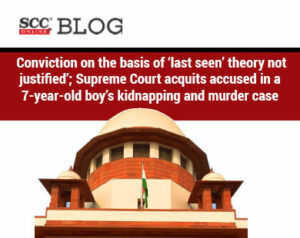Supreme Court: Exercising their criminal appellate jurisdiction, the division bench of S. Ravindra Bhat* and P.S. Narasimha, JJ., set aside the conviction and sentence of the accused and stated that their conviction was solely relied on the ‘last seen’ theory which was not justified.
In the matter at hand, the accused were convicted under Sections 302, 364 and 201 of the Penal Code, 1860 by the Trial Court and their conviction was affirmed by the Uttaranchal High Court.
A 7-year-old boy, resident of village Akbarpur went missing on 08-10-1999 and was found dead on 10-10-1999 in a sugarcane field in another village Narayanpur. First Information Report (‘FIR’) was registered 42 days later.
The Court noted that the concurrent conviction of the accused were solely based on the testimonies of the two witnesses who deposed to see the boy with the accused before he was found dead. The conviction thus, rested upon the ‘last seen’ theory, i.e., the boy was last seen in the company of the first two accused.
It was emphasised by the Bench that the ‘last seen’ theory had limited application, where the time lag between the time the boy was seen last with the accused, and the time of murder, was narrow. An accused should not be convicted only on the basis of the ‘last seen’ circumstance.
The Court stated that it was unusual that the family of the boy and accused allegedly had previous enmity and despite having heard the boy cry when he was seen in the company of the accused early in the morning, away from his house-given that he was only 7 years old, the witnesses did not bother to intercede. This was more so since the witnesses were admittedly relatives.
The Bench was appalled to see that the statement of one of the witnesses upon whom the conviction rested upon was recorded after more than two months after the beginning of investigation. Even the application under Section 156(3) of Code of Criminal Procedure, 1973 did not state that the witnesses had sighted the boy on or before the unfateful day with the accused. The Court stated that the witnesses testimony was unreliable since they did not corroborate with the circumstances of the case.
The Bench was further of the view that the basic principle of criminal jurisprudence is that in circumstantial evidence cases, the prosecution is obliged to prove each circumstance, as well the as the links between all circumstances, beyond reasonable doubt. Such circumstances, taken cumulatively, should form a chain so complete that there is no escape from the conclusion that within all human probability, the crime was committed by the accused and the same should unerringly point towards the guilt of the accused. The circumstantial evidence, in order to sustain conviction, must be complete and incapable of any other hypothesis than that of the guilt of the accused, and such evidence should not only be consistent with the guilt of the accused but should be inconsistent with his innocence.
The Bench opined that the testimonies of the witnesses who deposed to seeing the boy with the accused were seriously flawed and inconsistent, therefore, it couldn’t be said that the prosecution had proved its case beyond reasonable doubt.
Further, the Supreme Court stated that there was no evidence, oral or any material object which connected the accused with the crime. The serious inconsistencies in the depositions of the witnesses, as well as the fact that the FIR was lodged after 42 days after the incident, the sole reliance on the ‘last seen’ circumstance to convict the accused was not justified.
Therefore, held that the conviction and sentence of the accused could not be sustained, and the impugned judgment was thus, set aside.
[Jabir v. State of Uttarakhand, 2023 SCC OnLine SC 32, decided on 17-01-2023]
Judgment Authored by: Justice S.R. Bhat
Advocates who appeared in this case:
For Accused- Advocate on Record Vikrant Singh Bais, Advocate Yogesh Tiwari, Advocate Dushyant Singh Chauhan, Advocate Neema;
For Respondent- Advocate on Record Sudarshan Singh Rawat, Advocate Vikas Negi, Advocate Sunny Sachin Rawat.
*Simran Singh, Editorial Assistant summated the data.

